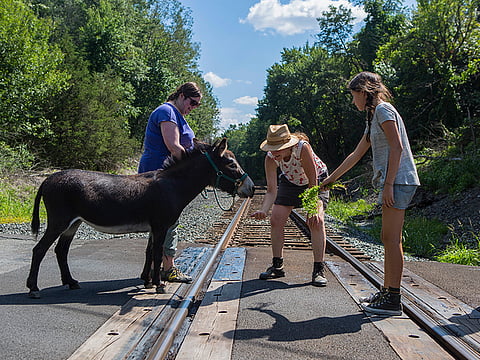Little, long-eared, stubborn therapists
Miniature donkeys taken to nursing homes and schools for therapy

New York: A miniature donkey can change your life. Ten of them can change it a lot.
Steve Stiert was explaining this the other day to two dozen people who had gathered at Donkey Park, otherwise known as his backyard, in Ulster Park, New York, two hours north of New York City.
“Donkeys, in my opinion, are the most misunderstood and underappreciated of man’s domesticated animals,” Stiert said. “They’re very kind animals, sweet, thoughtful. Their nature helps us get more back in touch with a calm state of mind and a simple way of life.”
Human guests, some seated on hay bales, nodded appreciatively. Three-foot-tall donkeys milled among them, nibbling on the hay bales.
Stiert’s sidekick, Flint, a grey-dun 4-year-old, approached a woman in a pink T-shirt. She made a kissy face. Flint responded by resting his head on her shoulder.
“What Flint is doing there is a hug,” Stiert explained. “In the wild, the mother will put her neck over the foal to keep them close.”
Five years ago, Stiert was a software engineer at IBM. A bunch of things happened — divorce, a layoff, a sort of reckoning. Now, at 57, he says, “Every day is donkey day.”
He takes his long-eared charges to nursing homes and schools for the disabled through a non-profit arm of Donkey Park. He also leads the Hudson Valley Donkey Walkers, a group organised through the networking site Meetup, that has amassed more than 400 (human) members who attend events such as this one.
On this day, the guests included Brittany Hill, who has been living with leukaemia for 11 years, and an extremely shy man who by the end of the afternoon would speak of the confidence that walking a donkey had given him.
Hill, 26, said she kept returning because donkeys “don’t judge.”
“They understand, even though they don’t talk,” she said.
Indeed, anyone expecting a miniature-donkey meetup to be some kind of braying contest was in for a surprise. “Their instinct is to ponder things,” Stiert said.
“They are very independent-minded,” he added. “They will come when they want to come. Watch this: Flint. Flint!” Flint looked up from his bale for a second, annoyed, then resumed eating.
Stiert got into donkeys in 2012 after his daughter, then a pre-veterinary student, told him she was joining a donkey club. He started watching donkey videos and was smitten. His first was Indy Anna, white with grey spots. Then came the brothers Romper and Stomper. Indy Anna begat Dakota, who at 27 inches tall is considered a micro-mini.
“People told me, ‘If you’re having a midlife crisis, get a sports car or a boat — you can sell those later,’” Stiert said. “I was like, ‘No, I love these animals.’”
His herd now includes a former sheep guard at the farm of celebrity decorator Sheila Bridges, a champion coon jumper (coon jumping is kind of like a standing high jump for donkeys), two standard donkeys and a zebra-donkey hybrid named Stripes.
Stiert had intended to use his donkeys mainly as therapy animals for nursing-home residents and people with disabilities, but he found “that people just leading average lives have really benefited from the donkeys, too.”
He and the donkeys have made many friends through Meetup. “A lot of the people you get on Meetup are going through transitions in their lives,” he said, “and they’re looking for something to do to keep themselves exploring.”
For all their surprising virtues, donkeys can be a little stubborn. As the donkey walkers turned down a lane and approached a railroad crossing, Bob Holstrom, a seasoned member of the meetup, offered a prediction. “Cocoa doesn’t cross the tracks,” he said. “She’s going to stop.”
Three steps later, Cocoa came to a halt. The walkers held out treats, stroked her back, called out gentle encouragement. Cocoa held her ground.



